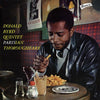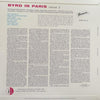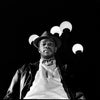





Donald Byrd Quintet – Parisian Thoroughfare (Byrd in Paris Volume 2) (Mono)
ORDER LIMITED TO ONE ITEM PER CUSTOMER
Donald Byrd (Trumpet) [click here to see more vinyl featuring Donald Byrd]
Bobby Jaspar (Flute on A3, Tenor Saxophone) [click here to see more vinyl featuring Bobby Jaspar]
Walter Davis Jr. (Piano)
Doug Watkins (Bass)
Art Taylor (Drums) [Click here to see more vinyl featuring Art Taylor]
1 LP, Facsimile reissue using the original cover art (front photo is lost) and double insert using an original photo by Jean-Pierre Leloir from 1958
Limited to 750 copies
Original analog Master tape : YES
Heavy Press : 180g
Record color : black
Speed : 33 RPM
Size : 12'’
Mono
Live
Record Press : Optimal in Germany using the Metal Mothers from Pallas
Label : SAM Records
Original Label : Brunswick
Recorded on October 22, 1958 at The Olympia Theatre in Paris
Produced by Fred Thomas
Photography by Jean-Pierre Leloir
Released in 1958
Reissued in 2019
Tracks:
Side A :
- Salt Peanuts (2’13)
- Parisian Thoroughfare (9’05)
- Stardust (3’19)
- 52nd Street Theme (6’42)
Side B
- At This Time (10’03)
- Formidable (9’28)
- Two Bass Hit (2’56)
- Salt Peanuts reprise (2’15)
Reviews :
« The second of two sets that document a Paris concert by trumpeter Donald Byrd, Parisian Thoroughfare features Bobby Jaspar on tenor and flute, pianist Walter Davis, Jr., bassist Doug Watkins, and drummer Art Taylor. Other than Byrd's "At This Time" and Davis' "Formidable," the quintet sticks to bop standards, many of which are quite concise and clock in at around three minutes. Longer versions of the title track (a high point) and "52nd Street Theme" are exceptions. This spirited, bop-oriented music is the equal of the first volume. » AllMusic Review by Scott Yanow
In its October ‘58 issue, the title carried by Jazz Hot magazine was: “Revelation at the Chat Qui Pêche’. The spirit of jazz (which some thought was dying) is sparkling with life in the Donald Byrd Quintet.” And indeed, on its first appearance at the Cannes Festival in July (the Jazz Festival, not the other one), the Donald Byrd Quintet brought the house down. Its members were hardly the Who’s Who of jazz, however. People vaguely knew that the leader had replaced Kenny Dorham in the Jazz Messengers, that Doug Watkins had played bass with them, and that pianist Walter Davis Jr. had been with Charlie Parker before he was 19. As for Art Taylor, if he’d already enjoyed a career longer than that of his colleagues, it hadn’t yet brought him recognition beyond a small circle of cognoscenti. Only Bobby Jaspar – who’d shone at the Club St. Germain – was famous with the Parisian audience.
After appearing in Cannes (in the sun) and Knokke-le-Zoute (a much smaller audience) for almost three months, the Donald Byrd Quintet settled down for the autumn in one of the capital’s top jazz spots, the Chat Qui Pêche on the Rue de la Huchette. To crown a tour that had been extremely satisfying for everyone, a concert at the Olympia theatre was organised (there were gigs there called “Jazz Wednesdays”). Byrd and Co. took things very seriously, even though they preserved the relaxed approach that their (relatively) long association now permitted: La Marseillaise, and And the angels sing are both present in the introduction to Parisian Thoroughfare played by the two horns. The latter then went on to imitate other horns, those of the cars on 52nd Street… However, when it came to Stardust, it was with all the seriousness in the world, almost in meditation in fact, that Donald Byrd improvised over the backing provided by just Walter Davis Jr. and Doug Watkins. Bobby Jaspar, of course, was marvellous. If he showed a marked obedience to Sonny Rollins, he still preserved, intact, the virtues of sobriety that prevented him falling into the trap of serving up torrents of notes in pieces taken at a rapid tempo (At This Time, for example). During the exchanges on Formidable, you’d be forgiven for saying that he gets the better of Donald Byrd. As for the complicity that reigned between the members of the rhythm section, it gave the formation a homogenous character that was very rare in a quintet.
Now, almost half a century later, one can only agree with Jazz Magazine’s critic on the subject of the Donald Byrd Quintet: “The only thing missing (…) was the consecration that a great concert in Paris would bring. They won that last battle with astounding brio in front of an audience of connoisseurs. There were many there who thought modern jazz had never been so well-served in Paris.” Alain Tercinet
Ratings :
AllMusic : 3 / 5 , Discogs : 4.82 / 5


